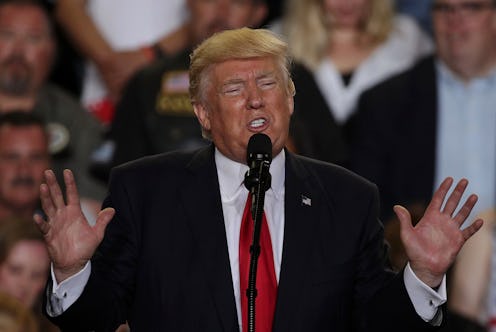News
This Is When Trump's Travel Ban Will Officially Be Implemented

Following the Supreme Court's decision to temporarily reinstate parts of President Trump's controversial travel ban on six Muslim-majority countries, the travel ban will officially take effect on Thursday at 8 p.m. EST.
A Department of Homeland Security spokesperson told NBC News that "detailed guidance will be provided to DHS professionals" so that they can begin carrying out the order on Thursday evening.
The measure, which Trump has referred to as a "watered-down, politically correct" version of his initial proposal, will place a 90-day ban on foreign travelers from Iran, Syria, Sudan, Somalia, Libya, and Yemen. Additionally, it will impose a 120-day ban on refugees fleeing persecution from any country.
Only travelers in the affected countries who can prove that they have a "credible claim of bona fide relationship" with an entity or individual in the United States are exempt from the ruling. This means that current visa-holders will not be affected; however, exactly what else counts as a "bona fide" relationship still remains to be clarified.
While the Trump administration claims that the order will be carried out "in a professional, organized and timely way," immigration experts worry that border agents may not yet be properly briefed on the nuances of the new rules and regulations.
"How will the airlines and Customs and Border Patrol treat arriving immigrants from any one of these countries?" Sarah Paoletti, director of the Transnational Legal Clinic at the University of Pennsylvania law school, told NBC News. "The airlines don't know immigration law and are now left to figure out what this all means."
Trump's initial travel ban, which included Iraq on the list of banned countries, caused chaos when it was signed into law in January as visa holders, students, and refugees who had already been approved to live in the United States were detained at airports across the country, leading to a flurry of protests and rallies in response.
Trump's revised travel ban had been struck down by two federal appeals courts in March who argued that the order amounted to religious discrimination against Muslims. While this temporarily blocked the ban from being implemented, the Supreme Court of the United States ruled on Monday they will hear arguments on the ban in the fall, allowing it to remain in the meantime, with some limits on provisions contained in the initial executive orders.
President Trump maintains that travelers from these countries pose a significant threat to U.S. national security, and that the travel ban is an effort to keep Americans safe.